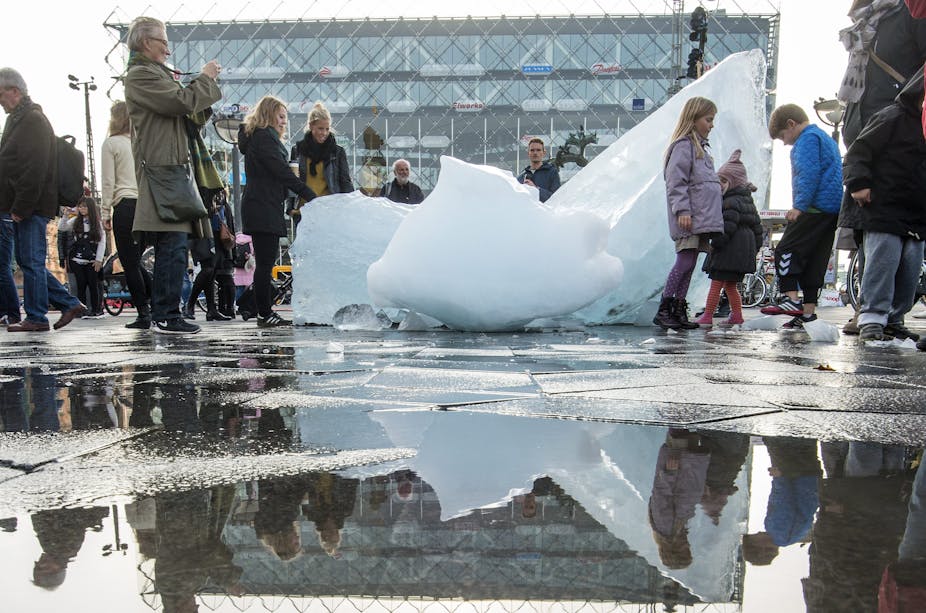Members of the Intergovernmental Panel on Climate Change (IPCC) say they are confident their latest report, released in Copenhagen today, will help give politicians the impetus to commit to the deep emissions cuts needed to meet the world’s goal of limiting global warming to 2 degrees.
Jim Skea, a vice-chair of the IPCC’s Working Group 3, which deals with measures to mitigate climate change, described the new Synthesis Report as “the most important report the IPCC has ever produced”, given that it will inform negotiations at next year’s United Nations climate talks in Paris.
The report sums up the the key messages from the three larger IPCC reports released since September last year, which together form its landmark Fifth Assessment Report.
It reiterates that climate warming is “unequivocal”, points out that atmospheric greenhouse gases are now at their highest levels for 800,000 years, and says human activity is “extremely likely” to be the dominant cause of the warming since the mid-20th century.
“I don’t think politicians will have the excuse that they haven’t heard the evidence,” Professor Skea said.
The report concludes that emissions need to fall by 40-70% by 2050 if the world is to give itself a good chance of staying within the 2C limit. European Union leaders recently pledged to cut emissions by 40% by 2030.
More than half of the world’s current emissions are now covered by formal climate policies, Prof Skea said.
“The question is how quickly we get on with the job. It’s not the job of the IPCC to make recommendations and tell policy-makers what to do, but what the report does identify is big advantages from early action. The more quickly we get on with reducing emissions, the fewer will be the kind of really difficult impacts that we have to deal with,” he said.
His views were echoed by IPCC chair Rajendra Pachauri, who said in a statement: “We have the means to limit climate change. The solutions are many and allow for continued economic and human development. All we need is the will to change, which we trust will be motivated by knowledge and an understanding of the science of climate change.”
Bureau of Meteorology researcher Scott Power, a lead author on the IPCC’s Working Group 1, which covers the science of climate change, said that the world has already used up around three-quarters of its total “carbon budget”. World emissions are now at their highest ever level, and are still growing by 2.2% per year.
Total emissions since the Industrial Revolution are around 600 gigatonnes of carbon, he said. If we let them go past around 800 gigatonnes, it would “lock in” warming of more than 2C. “That would increase the likelihood of severe and pervasive impacts,” he said.
CSIRO oceanographer John Church, also a Working Group 1 lead author, said the report underlines the dangers of unchecked warming, which will include increased heatwaves and bushfire risk, coral bleaching, and sea-level rise.
But he said the report also sounds a note of optimism about the measures we can take to cut emissions, including improving energy efficiency and embracing renewable energy, and that there is scope for emissions to be cut rapidly. “There is some low-hanging fruit,” he said.
“But the longer we leave it, the harder it gets – that’s very clear, and we’ve already missed opportunities. There isn’t a specific ‘drop-dead’ date; it just becomes harder to hit specific targets, and we would have to invest more to meet those targets.”
One of those missed opportunities was the 2009 UN summit in Copenhagen, which reached only a non-binding accord on actions to cut emissions. But many IPCC members have faith that next year’s Paris negotiations can deliver a more meaningful outcome.
“Maybe our expectations were unrealistically high. I think expectations are beginning to rise again, but probably they are more realistic … than they were at Copenhagen. We have to be optimistic,” Dr Church said.
The IPCC is set to review its current strategy of producing large reports every few years, amid some criticism that the approach is unwieldy.
Dr Church said it “would be great to be more nimble”, but added that the process is unlikely to undergo significant changes because the time and effort taken to compile comprehensive IPCC reports makes them “the most robust information available”.


